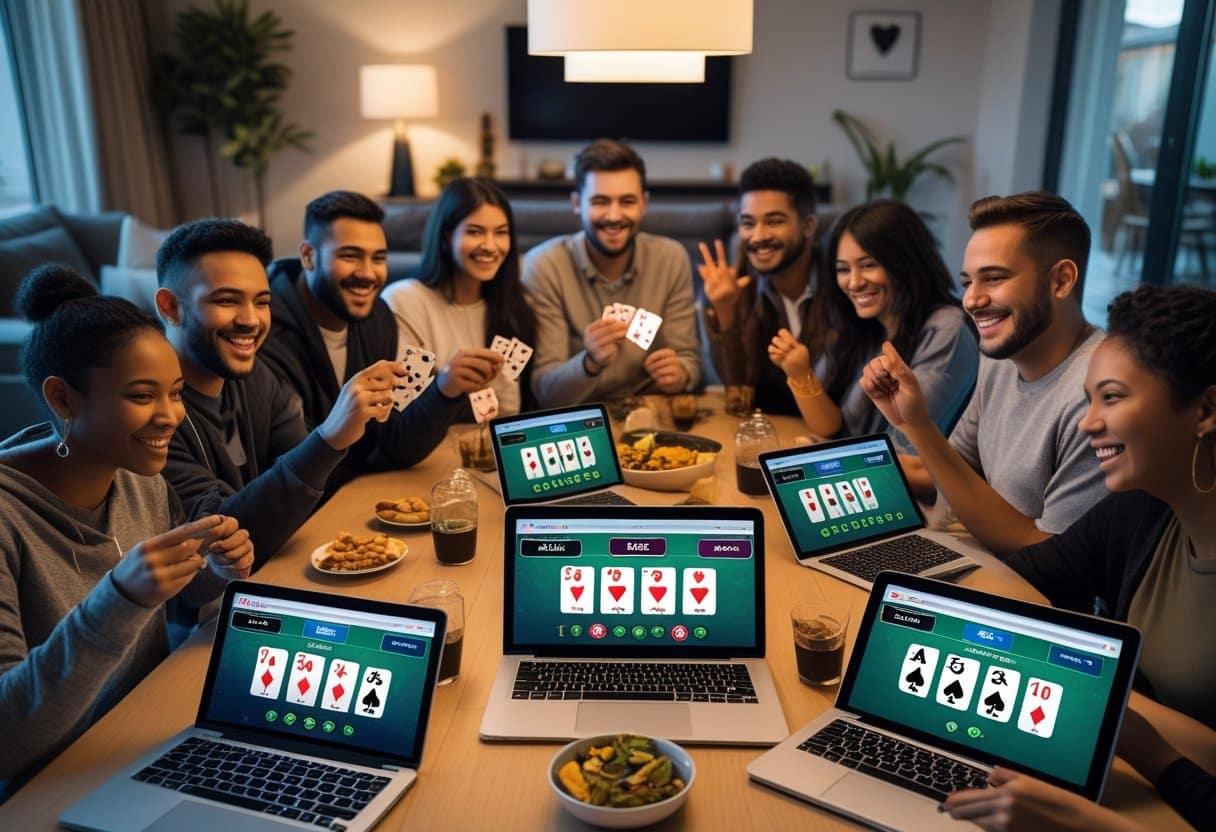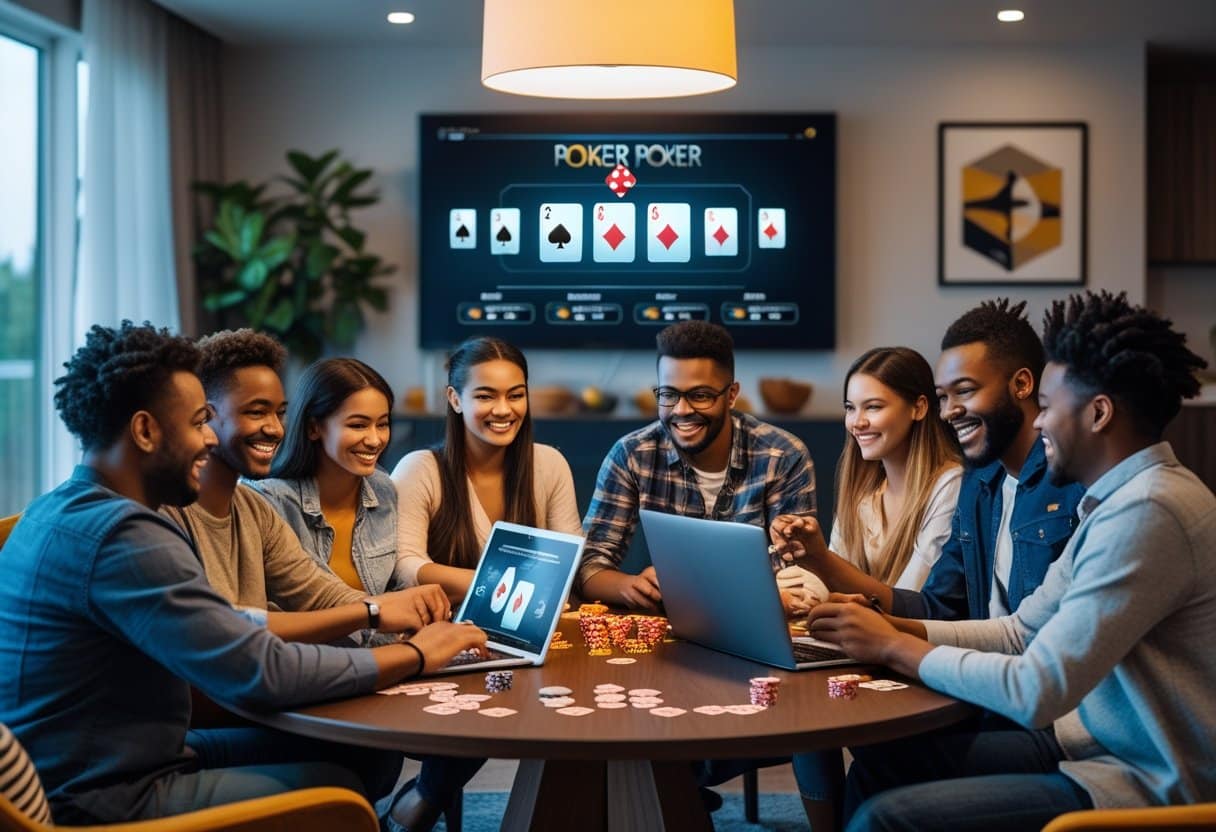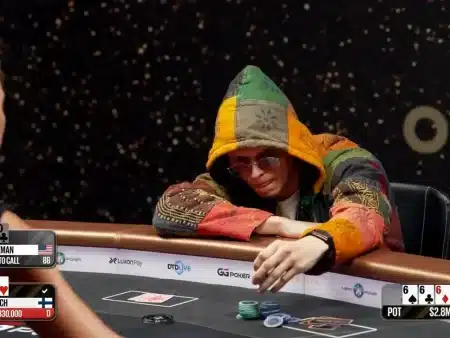Playing poker online with friends is, honestly, a pretty great way to hang out—especially if you’re all in different places. You don’t need to be in the same room to enjoy the thrill of the game, and let’s face it, sometimes it’s just more convenient to play from your couch.
There are a bunch of solid platforms these days that make virtual poker nights possible and, more importantly, actually fun.

The most popular platforms for playing online poker with friends include PokerStars, 888poker, WSOP App, partypoker, and PPPoker, all offering user-friendly interfaces and various game options. These sites let you set up private tables, invite only your crew, and mess around with different poker types like No-Limit Hold’em, Pot-Limit Omaha, or tournaments.
Getting a game going is usually pretty straightforward, though a few platforms might ask you to buy some in-app “gold” or make a small purchase to create private tables. People seem to like the flexibility—whether you want a relaxed cash game or a more intense tournament with custom blinds and buy-ins, you’ve got options.
This means you can play whether you’re a hardcore grinder or just looking for a fun way to catch up with friends.
Understanding Online Poker With Friends

Online poker with friends is really just classic poker, but with a digital twist. You get to play your favorite game with your group, even if you’re miles apart.
The core of poker’s still there, but now you’ve got some cool digital perks thrown in.
How Online Poker Differs From Live Play
Instead of sitting at a table, everything happens on your screen. The cards and chips? All digital.
The software takes care of dealing, blinds, pots, and keeping track of whose turn it is. You don’t have to worry about shuffling or counting chips.
Chatting happens through text or, if you’re feeling fancy, voice and video calls. You lose the face-to-face reads, so you end up watching betting patterns and timing instead.
A lot of sites let you change up table themes, card designs, or even create your own tournament setup. Games just move faster online—way more hands per hour than you’d get in person.
And, honestly, the digital security is a bonus. Random number generators keep things fair, so you don’t have to worry about someone stacking the deck.
Benefits of Playing Poker Remotely
The convenience is hard to beat. You can jump into a game from pretty much anywhere with WiFi—no need to drive across town.
Scheduling is super flexible, so friends in different time zones can all make it work. No more trying to find a night everyone’s free to meet up.
You also save cash since there’s no venue, no tipping dealers, and no travel costs. Most platforms offer both free and real-money games.
There’s a ton of game variety—way more than you’d usually get in a home game. With just a few clicks, you can try out new poker variants.
If you’re new to poker, most sites have tutorials and rulebooks built in. You can play low stakes or even free games while you learn.
Types of Online Poker Games With Friends
Texas Hold’em is still the king online—easy to learn, hard to master. Two private cards, five on the table, best hand wins.
Omaha shakes things up by giving you four private cards, but you can only use two with the community cards. The strategy gets wild, and the pots can get big fast.
Seven-Card Stud is more old-school, with players getting seven cards (some up, some down) to make the best five-card hand.
You’ve got options for tournaments—single-table, multi-table, custom blinds, whatever fits your group. Buy-ins can be as low or high as you want.
Cash games are more laid-back. You can join or leave whenever, buying in for whatever amount feels right for your group.
Complete Setup Guide for Playing Poker Online With Friends
Getting your online poker night off the ground is mostly about picking the right platform, setting up your table, and making sure everyone’s on the same page. A little prep goes a long way to keeping things smooth.
Choosing the Right Online Poker Platform
Choosing where to play is a big deal. You want a site that lets you set up private tables just for your group.
PokerNow is a favorite—no downloads, no sign-up, up to 10 players, and built-in video/voice chat. Can’t really beat that for ease.
Other sites have “Home Game” features but might ask you to make an account. Think about what matters: game variety, device compatibility, and how much setup you want to deal with.
Free platforms are usually enough for casual games, but paid ones might run smoother or have more features. It’s also worth checking if there’s decent customer support in case someone gets booted mid-hand.
Setting Up Private Poker Tables
Once you’ve picked a platform, making a private table is usually quick. Most sites walk you through the basics.
You’ll pick:
- Game type (like Hold’em or Omaha)
- How many players
- Buy-in or play money
- Blinds and timer settings
- Cash game or tournament
For tournaments, you can stick with the standard or tweak it however you like. Some sites let you save your settings, which is handy if you play regularly.
You’ll usually get a unique table link or password to keep things private. It’s smart to do a quick test run before game night so nobody’s scrambling at the last minute.
Inviting Friends and Managing Access
Inviting friends is simple on most platforms. You can usually:
- Share a unique link via text or email
- Give out a table password
- Send invites directly if everyone’s got an account
Set up a group chat somewhere to share details and help with any issues. That way, everyone knows when and where to join.
If you play a lot, look into creating a private club or group on the platform. It makes organizing games way less of a hassle and keeps your regulars together.
Decide on ground rules for inviting new players, just to keep the vibe right.
Basic Technical Requirements
Make sure everyone’s tech is up to the task before game night. At a minimum, you’ll need:
Device compatibility: Double-check the site works on everyone’s laptop, tablet, or phone.
Internet connection: Stable is key—wired is best, but solid WiFi usually does the trick.
Browser requirements: Some sites work better on Chrome or Firefox, so give folks a heads-up.
Audio/video needs: If you want to use chat, webcams and mics help, but they’re not always required.
Ask everyone to join early for a quick tech check. Closing extra apps can help with speed.
If someone’s on an older device, most poker sites have a mobile version that’s lighter on resources.
Top 5 Platforms to Play Online Poker With Friends
There are a handful of platforms that really stand out for hosting online poker nights with friends. Each has its own perks, quirks, and game selection.
Comparing the Leading Poker Sites
PokerStars is still the giant—tons of players, private home games, and you can customize tournaments and cash games however you like. The software’s solid and works on pretty much anything.
PokerNow.club and PokerPatio.com are super easy to use, no downloads needed. You can set up a table and invite friends with just a link.
888poker is a nice middle ground—secure and easy to use. You can set passwords on private tables and pick from a bunch of different poker variants.
The iPoker network (think Betfair Poker) is good if you want flexible buy-ins and bigger tournaments. Works well for larger groups.
Stake.US is getting more popular, mostly because it’s easy to use and has some neat social features for playing with friends.
Unique Features and Game Offerings
PokerStars is all about variety—Sit & Go’s, multi-table tournaments, and cash games in Hold’em, Omaha, and more. Their mobile app is actually pretty good, too.
PokerNow.club is cool if you want video chat built in. No registration needed, which is handy for spur-of-the-moment games.
| Platform | No Download | Video Chat | Game Variety | Mobile Support |
|---|---|---|---|---|
| PokerStars | No | No | Excellent | Yes |
| PokerNow | Yes | Yes | Good | Yes |
| 888poker | No | No | Very Good | Yes |
| iPoker Sites | No | Varies | Good | Yes |
| Stake.US | Yes | No | Basic | Yes |
888poker has some unique options like SNAP poker and private tournaments with flexible setups. You can really tweak the table settings to fit your group.
Security and Fair Play Measures
PokerStars takes security seriously—encrypted connections, regular audits, and a team that watches for collusion.
888poker protects your data with SSL encryption and uses algorithms to spot suspicious betting.
Most networks get their random number generators certified by independent agencies like eCOGRA or iTech Labs. That means the dealing is fair.
Browser-based sites like PokerNow are simpler, so while they’re easy to use, they don’t have quite the same security as the big names.
If you’re playing for real money, it’s worth sticking with platforms that have strong security. For low-stakes or play money, convenience might matter more.
Popular Online Poker Game Variations and Formats
There’s no shortage of ways to mix up your online poker nights. Different games and formats keep things interesting and let everyone find their groove.
Texas Hold’em and Its Online Appeal
Texas Hold’em is the go-to for most online players. Two private cards, five on the table—make the best hand you can.
It’s easy for newbies to pick up, but there’s enough depth to keep veterans coming back. Most sites offer:
- No-Limit Hold’em: Bet whatever you want, whenever you want
- Limit Hold’em: Bets are capped, so things don’t get too wild
- Turbo Hold’em: Faster blinds for people who want a quicker game
You’ll always find a Hold’em table running, from penny stakes to nosebleed limits.
Omaha and Other Poker Variants
Omaha’s got its own following. Four private cards, but you have to use exactly two with the three on the table.
The hands get bigger, and the action can get wild—especially in Pot-Limit Omaha (PLO).
Other options include:
- Seven-Card Stud: Classic, slower-paced, more info on the table
- Razz: Lowest hand wins, which throws some people for a loop
- Mixed Games: Like H.O.R.S.E., where you rotate through different poker types
If you’re bored of Hold’em, these can be a fun change of pace.
Cash Games, Tournaments, and Sit & Go
Cash games are straightforward—buy in, play as long as you want, and cash out whenever. Every chip is real money, so every hand matters.
Tournaments have a set entry fee, and you play until one person has all the chips. Payouts go to the top finishers.
Sit & Go’s start as soon as enough people join—usually 9 or 10. They’re great if you want a quick tournament without waiting.
Tournament formats to try:
- Multi-table tournaments (MTTs) with tons of players
- Progressive knockouts where you get bounties for eliminating others
- Fast-fold games that move you to a new table as soon as you fold
Multi-Tabling for Advanced Players
If you’re feeling ambitious, multi-tabling lets you play on several tables at once. It’s a good way to up your volume, but it takes focus.
Most sites let you play on 4-24 tables, though honestly, that’s a lot for most people. Some folks use software to organize everything on their screen.
A few quick tips:
- Start with 2-4 tables and see how it goes
- Use a HUD (Heads-Up Display) if you want to track stats
- Set up hotkeys for faster play
- Only add more tables when you’re comfortable
There’s a tradeoff—more tables means less time to think, so don’t overdo it. Many regulars find 8-12 is their sweet spot.
Bonus Features and Social Enhancements
Poker online with friends isn’t just about the cards—most platforms add cool extras to make game night more fun.
Freerolls and Jackpot Events
Freerolls are tournaments you can enter for free but still win real prizes. A lot of sites toss out free chips every hour—like PokerStars, which gives you 15,000 chips every 60 minutes just for logging in.
Jackpot events are a blast, with prize pools that keep growing until someone wins big. These usually pop up on weekends or special occasions, and they’re a great excuse to get the group together.
Some sites even let you set up private freerolls just for your friends, so you’re not battling random strangers for the top spot.
Progressive jackpots can add a bit of suspense—nothing like seeing someone in your group hit a huge win out of nowhere.
Chat, Video, and Social Tools
Modern poker platforms these days pack in a bunch of communication features. Text chat’s there if you want to talk smack or just chat during hands, and honestly, voice chat makes it feel a bit more like you’re sitting around a real table—no frantic typing required.
Video options? Those are a game changer. Seeing actual faces at the virtual table just feels different, almost like you’re back in your buddy’s living room.
Some sites let you use avatars and toss in emojis for those moments when words don’t quite cut it. It’s not the same as slamming your chips, but hey, it’s something.
Social sharing tools are everywhere now. If you hit a huge win or get crushed by a ridiculous hand, you can post it straight to your feed—because why keep it to yourself?
Friend lists and notifications are handy, too. You’ll get a ping when your crew logs on, so you can pull together a game without the endless group texts.
A few platforms even track stats between friends, which adds a little extra spice to the rivalry. Who doesn’t want bragging rights?













